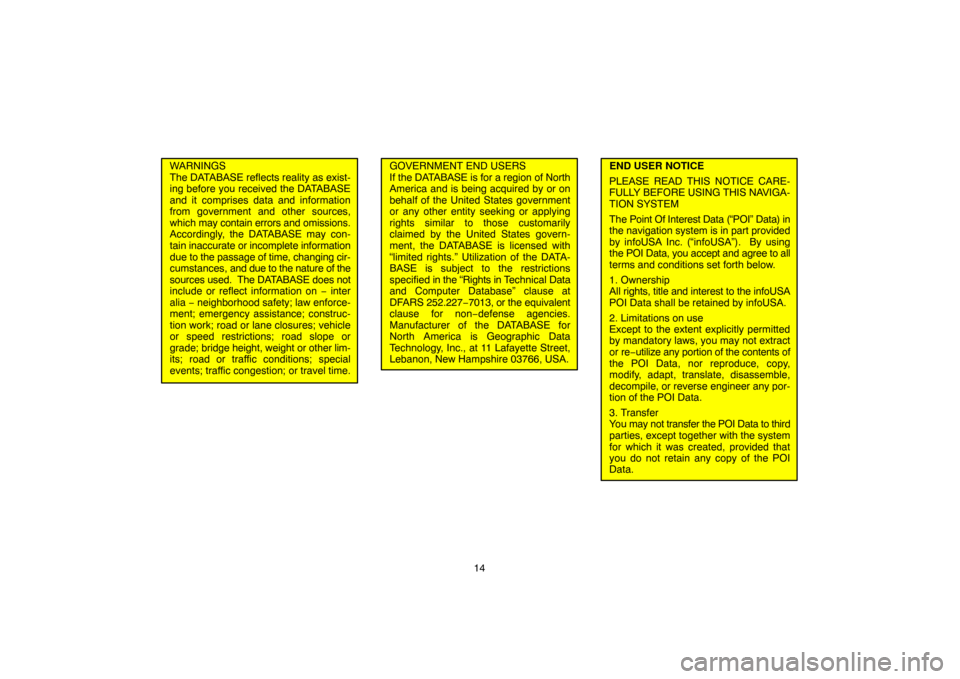lane assist TOYOTA SEQUOIA 2007 1.G Navigation Manual
[x] Cancel search | Manufacturer: TOYOTA, Model Year: 2007, Model line: SEQUOIA, Model: TOYOTA SEQUOIA 2007 1.GPages: 161, PDF Size: 5.97 MB
Page 1 of 161

i
Introduction
Thank you for your purchase of the Navigation System. Please read this manual carefully to ensure proper use. Keep this manual
in your vehicle at all times.
The Navigation System is one of the most technologically advanced vehicle accessories ever developed. The system receives satellite sig-
nals from the Global Positioning System (GPS) operated by the U.S. Department of Defense. Using these signals and other vehicle sensors,
the system indicates your present position and assists in locating a desired destination.
The navigation system is designed to select efficient routes from your present starting location to your destination. The system is designed
to direct you to a destination that is unfamiliar to you in an efficient manner. The system uses the maps of DENSO. The calculated routes
may not be the shortest nor the least traffic congested. Your own personal local knowledge or “short cut” may at times be faster than the calcu-
lated routes.
The navigation system’s database includes about 75 Point of Interest categories to allow you to easily select destinations such as restaurants
and banks. If a destination is not in the database, you can enter the street address or a major intersection close to it and the system will guide
you there. The system will provide both a visual map and audio instructions. The audio instructions will announce the distance remaining
and the direction to turn in approaching a fork or intersection. These voice instructions will help you keep your eyes on the road and are timed
to provide enough time to allow you to maneuver, change lanes or slow down.
Please be aware that all current vehicle navigation systems have certain limitations that may affect their ability to perform properly.
The accuracy of the vehicle’s position depends on the satellite condition, road configuration, vehicle condition or other circumstan-
ces. For more information on the limitations of the system, refer to pages 10 through 12.
Page 27 of 161

14
WARNINGS
The DATABASE reflects reality as exist-
ing before you received the DATABASE
and it comprises data and information
from government and other sources,
which may contain errors and omissions.
Accordingly, the DATABASE may con-
tain inaccurate or incomplete information
due to the passage of time, changing cir-
cumstances, and due to the nature of the
sources used. The DATABASE does not
include or reflect information on − inter
alia − neighborhood safety; law enforce-
ment; emergency assistance; construc-
tion work; road or lane closures; vehicle
or speed restrictions; road slope or
grade; bridge height, weight or other lim-
its; road or traffic conditions; special
events; traffic congestion; or travel time.GOVERNMENT END USERS
If the DATABASE is for a region of North
America and is being acquired by or on
behalf of the United States government
or any other entity seeking or applying
rights similar to those customarily
claimed by the United States govern-
ment, the DATABASE is licensed with
“limited rights.” Utilization of the DATA-
BASE is subject to the restrictions
specified in the “Rights in Technical Data
and Computer Database” clause at
DFARS 252.227−7013, or the equivalent
clause for non−defense agencies.
Manufacturer of the DATABASE for
North America is Geographic Data
Technology, Inc., at 11 Lafayette Street,
Lebanon, New Hampshire 03766, USA.END USER NOTICE
PLEASE READ THIS NOTICE CARE-
FULLY BEFORE USING THIS NAVIGA-
TION SYSTEM
The Point Of Interest Data (“POI” Data) in
the navigation system is in part provided
by infoUSA Inc. (“infoUSA”). By using
the POI Data, you accept and agree to all
terms and conditions set forth below.
1. Ownership
All rights, title and interest to the infoUSA
POI Data shall be retained by infoUSA.
2. Limitations on use
Except to the extent explicitly permitted
by mandatory laws, you may not extract
or re−utilize any portion of the contents of
the POI Data, nor reproduce, copy,
modify, adapt, translate, disassemble,
decompile, or reverse engineer any por-
tion of the POI Data.
3. Transfer
You may not transfer the POI Data to third
parties, except together with the system
for which it was created, provided that
you do not retain any copy of the POI
Data.